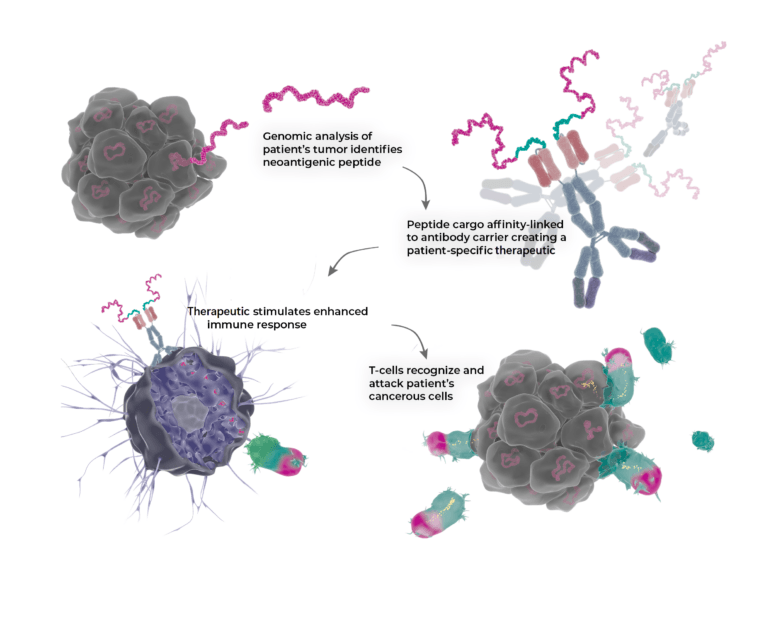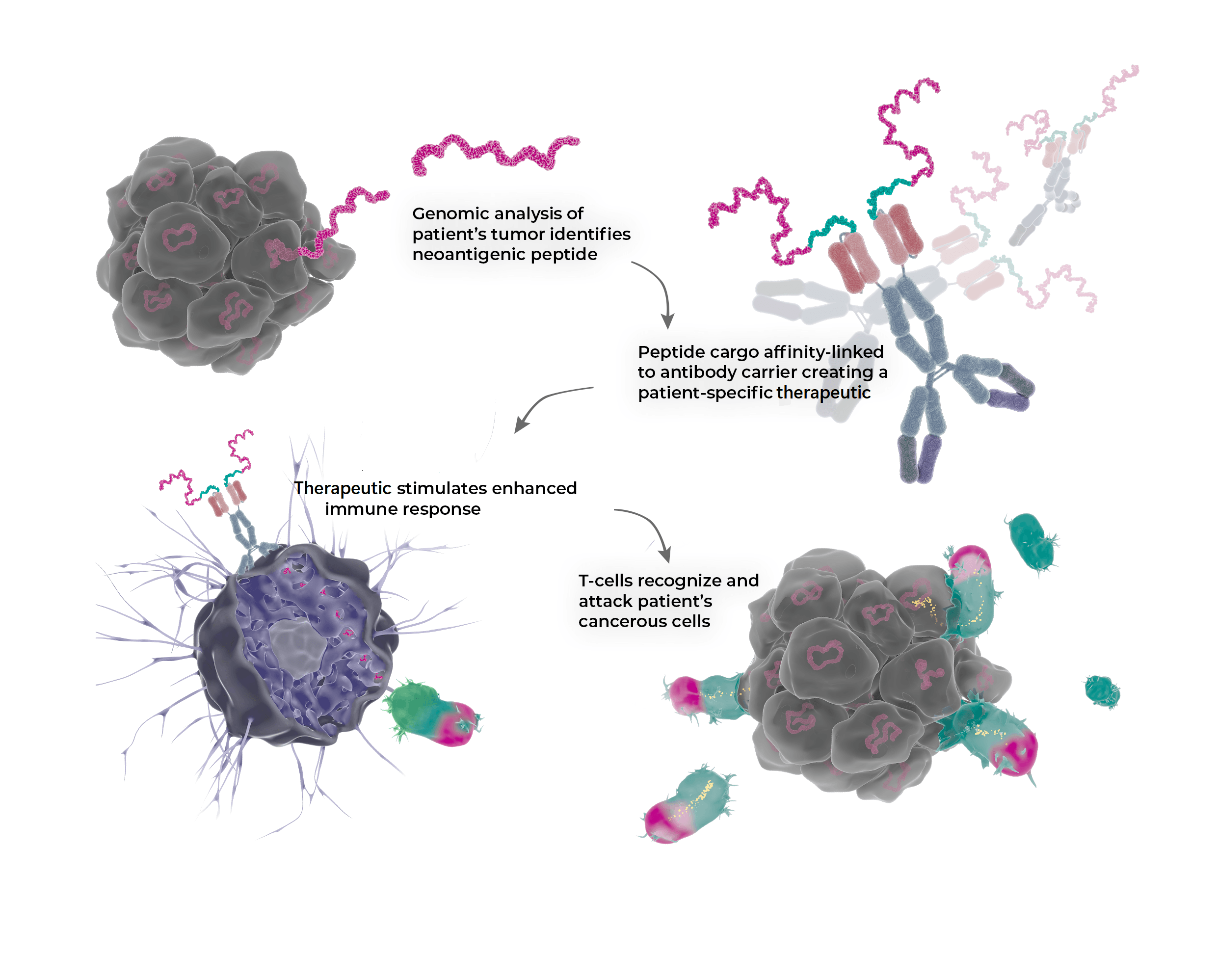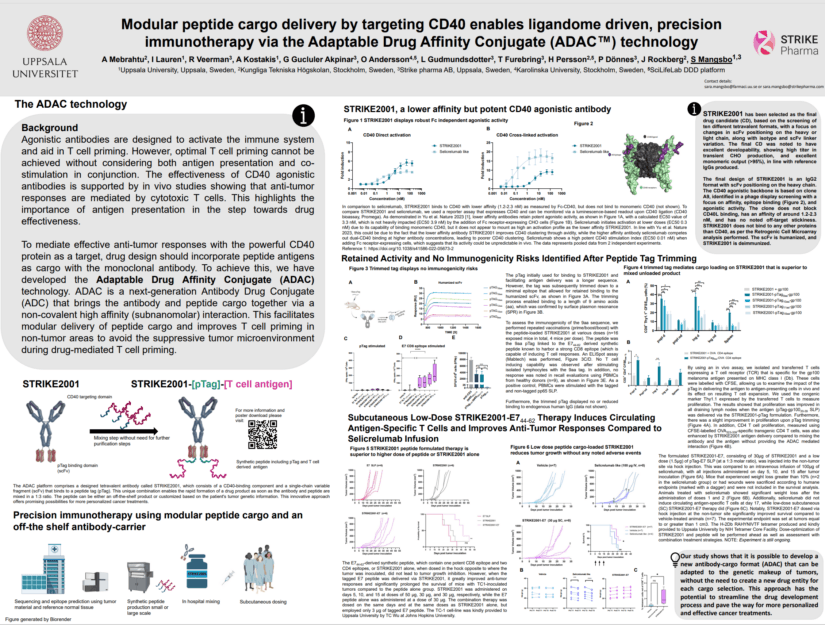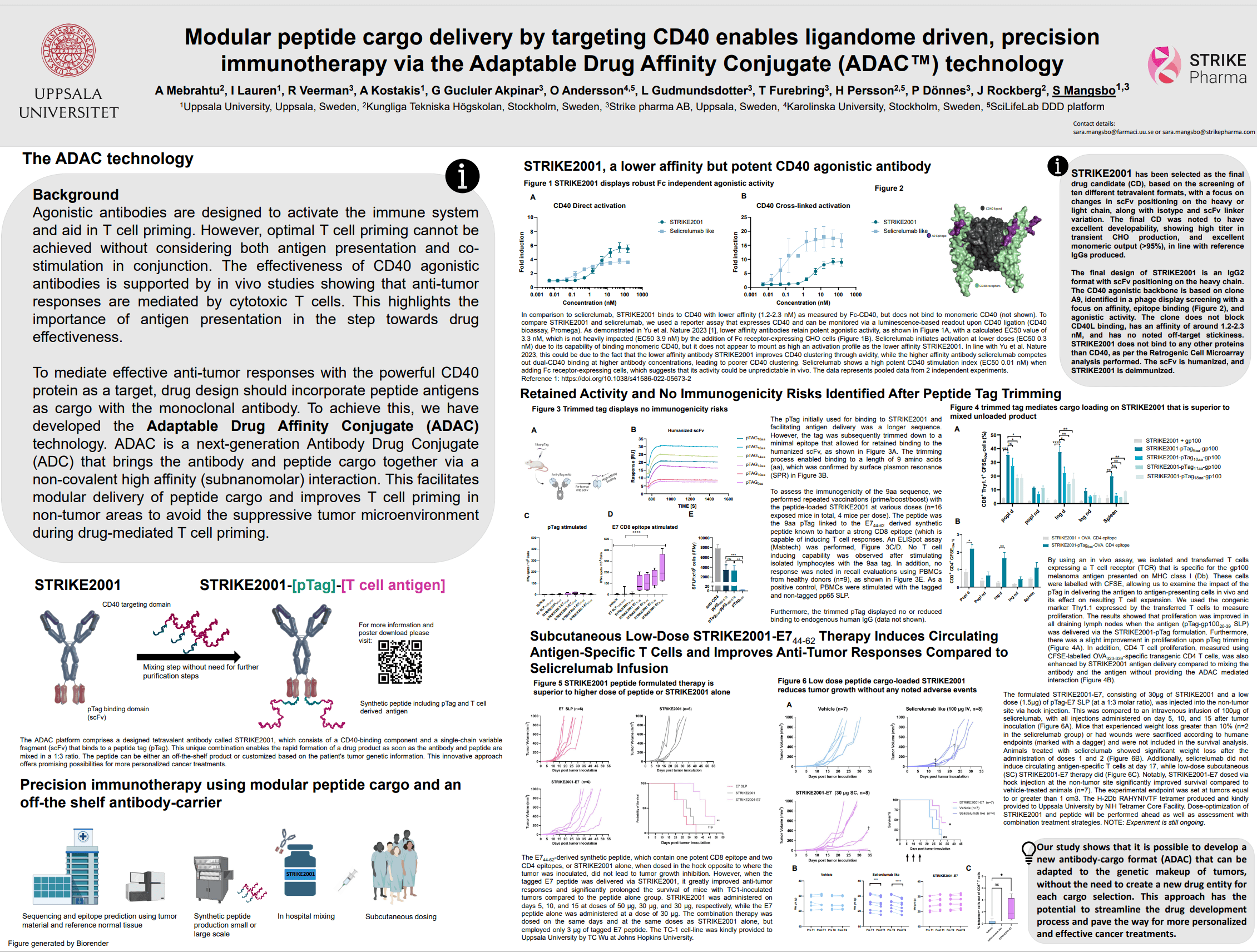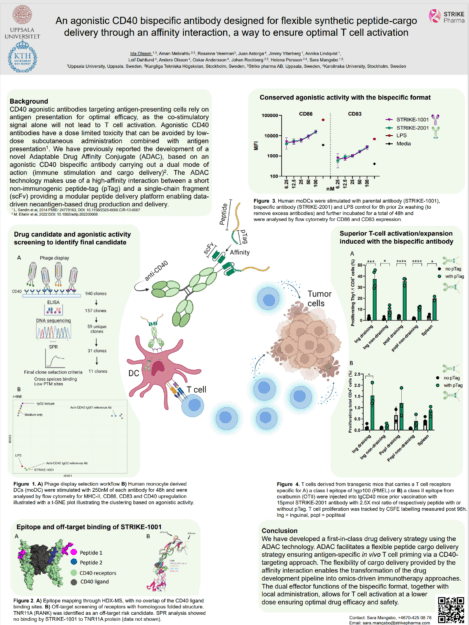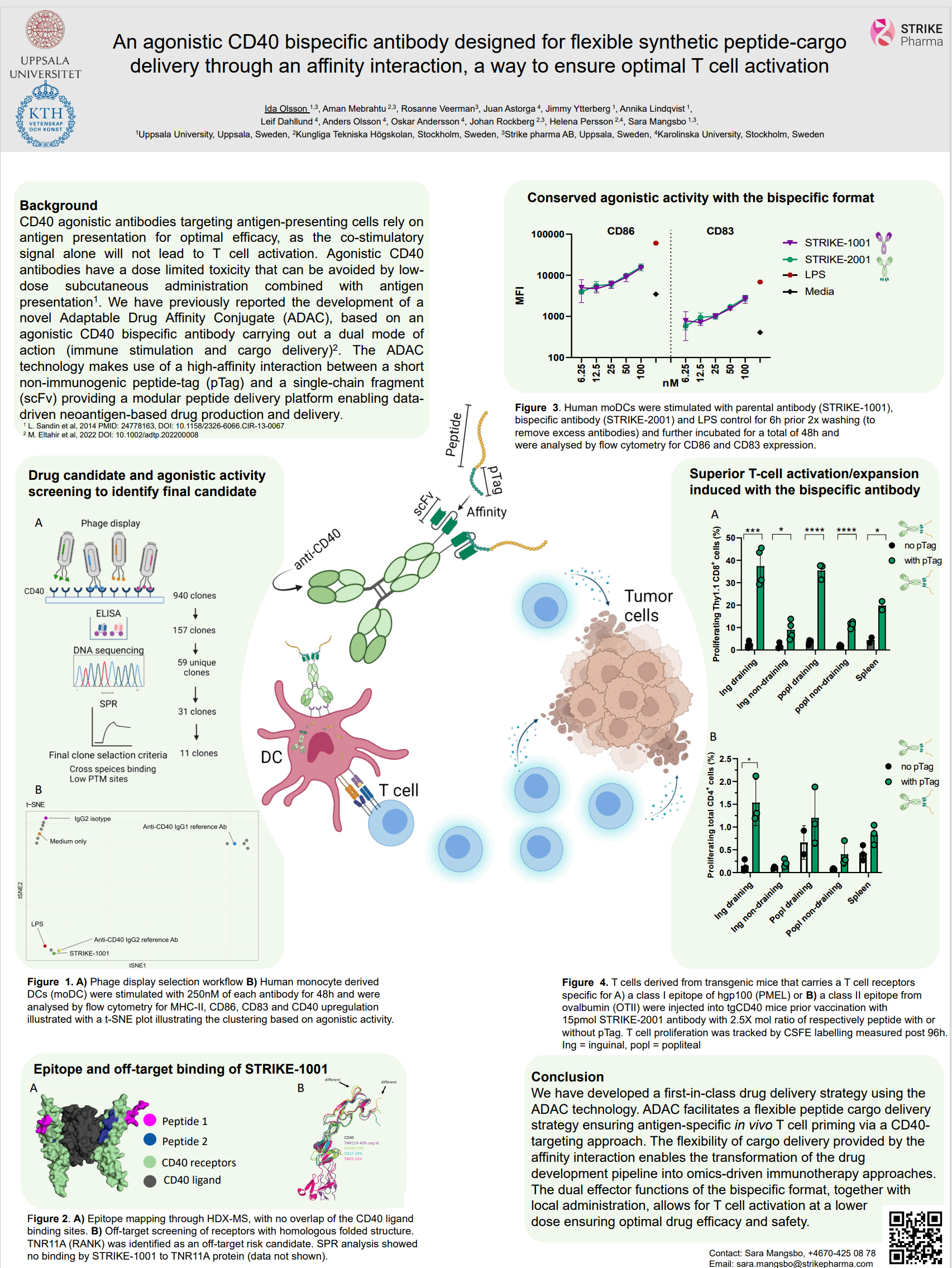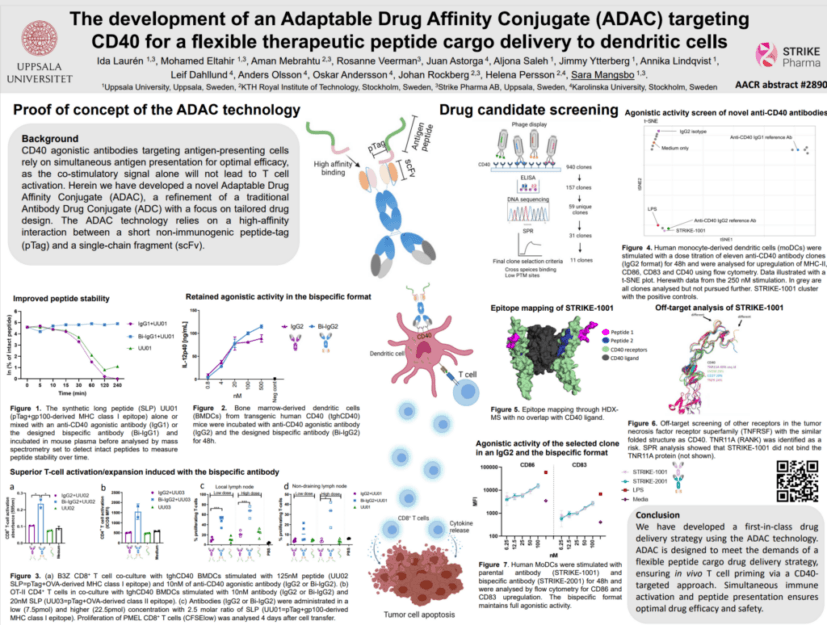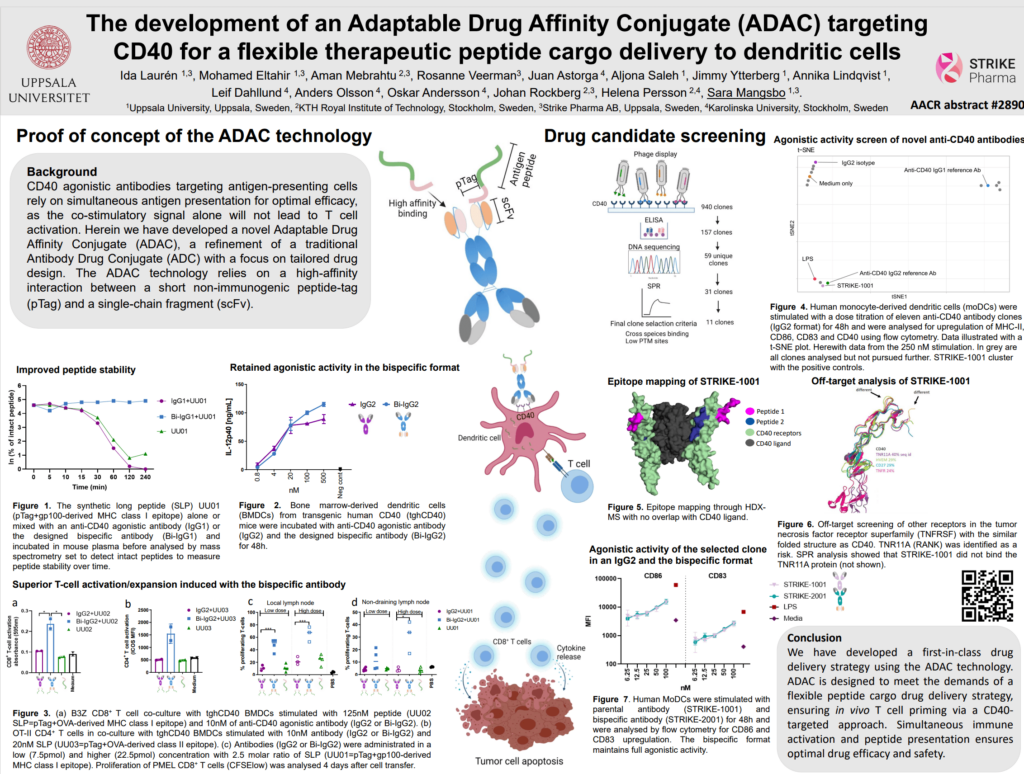Throughout the rapidly developing field of personalized medicine, Strike Pharma’s proprietary Adaptable Drug Affinity Conjugate (ADACTM) technology platform offers an agnostic technology for the future, enabling the development of novel antibody-based treatments tailored to the individual patient and applicable across a wide variety of disease indications.
Application of ADAC technology will enable development of highly targeted, immunotherapeutic treatments capable of generating an enhanced immune response and with a prolonged half-life to ensure that the body’s immune system continues to find and destroy targeted cells regardless of location.
This novel platform has the potential to bring new, patient-specific immunotherapeutic treatments to market:
- Improve overall efficacy
- Deliver a cargo, such as a neoantigenic peptide, based on the genetic profile of the patient or tumor
- Efficient delivery – design flexibility ensures correct presentation of cargo and can prolong half-life
- For example, for delivery of an antigenic peptide to stimulate an immunotherapeutic response
- Reduce development times
- For example, eliminate the need to redesign a complete therapeutic molecule by using a universal, non-immunogenic peptide tag to link a tumor-specific, antigenic peptide sequence
- Contribute to improved cost-effectiveness per treatment
- Produce small-scale quantities of a highly targeted, patient-specific therapeutic with reduced dosage requirements
- Accelerate the path through clinical trials to final approval
- lower demands on regulatory requirements
- no new chemical entity (NCE) – change only the cargo, most manufacturing release criteria pre-established
- minimize risk of toxicity – highly targeted, individualized treatments keep dosage to a minimum
How it works. Antibody carrier delivers a synthetic, tumor-associated antigenic peptide to dendritic, antigen-presenting cells (APCs) which, in turn, are recognized by T-cell lymphocytes thereby stimulating an immune response and ensuring that more T-cells continue to be produced in the patient’s body to attack cancerous cells.
The objective of any immunotherapeutic is to target specific cell types while reducing systemic exposure to healthy cells and so minimizing toxicity.
Current immunotherapeutic approaches work in different ways, but there are still many challenges to overcome, such as ensuring the effectiveness of the induced immune response and managing the high level of variation in individual responses.
Peptide- or antibody-based therapeutics have been used to stimulate de novo generation of T-cell lymphocytes that then target cancerous cells. However, so far these therapies have lacked sufficient efficacy. While cell-based therapies have been more successful in stimulating the body’s immune system, the ex-vivo procedures required are both cumbersome and costly.
Stable affinity-linkage of peptide cargo to antibody carrier – using ADAC technology
Using a monoclonal antibody as a carrier to enable targeted delivery of cytotoxic drug cargos to diseased cells has already led to the development of several FDA-approved antibody-drug conjugates (ADCs) for treatment in a range of cancers. However, when cargoes such as antigenic peptides need to be delivered, conventional chemical conjugation methodologies used to link a drug to the antibody present several challenges that can lead to sub-optimal delivery and reduced efficacy.
The Adaptable Drug Affinity Conjugate (ADAC) technology platform utilizes an affinity-based biomolecular interaction to link a peptide cargo to its antibody carrier.
- Unlimited design flexibility facilitates development of individualized treatments based on the genetic profile of a patient’s tumor
- The stable affinity-link between carrier and cargo improves peptide stability and efficiency of delivery
- The ability to carry and correctly present the antigenic peptide cargo has the potential to greatly increase efficacy
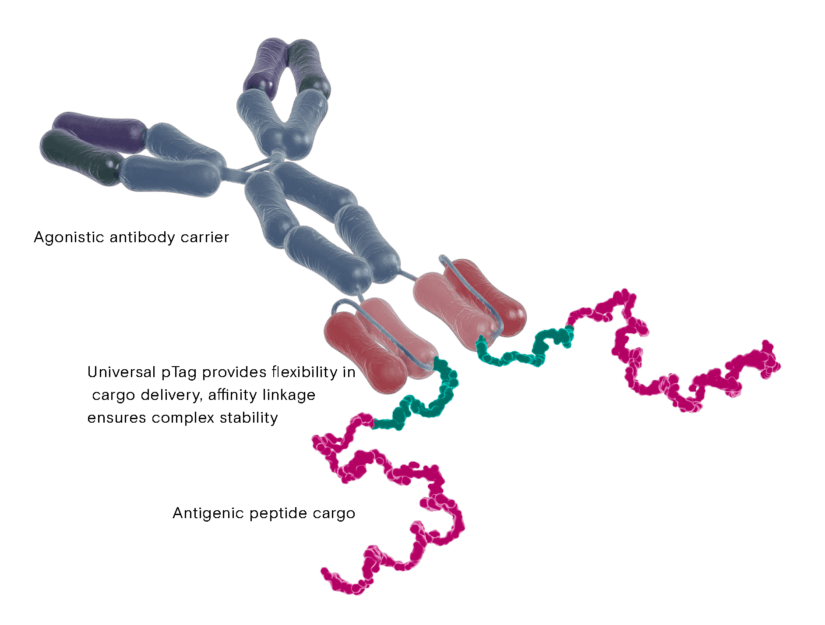
A high-affinity interaction between a short non-immunogenic peptide-tag (pTag) and a single-chain fragment (scFv) of the antibody enables attachment of the peptide cargo.
Today, Strike Pharma is using ADAC technology to generate novel therapeutic candidates in which synthetic, neoantigenic peptide cargoes, previously identified in solid tumors, are linked to well-characterized CD40 agonistic antibody carriers.
Modular peptide cargo delivery by targeting CD40 enables ligandome driven, precision immunotherapy via the Adaptable Drug Affinity Conjugate (ADAC™) technology
A Mebrahtu2, I Lauren1, R Veerman3, A Kostakis1, G Gucluler Akpinar3, O Andersson4,5, L Gudmundsdotter3, T Furebring3, H Persson2,5, P Dönnes3, J Rockberg2, S Mangsbo1,3
1Uppsala University, Uppsala, Sweden, 2Kungliga Tekniska Högskolan, Stockholm, Sweden, 3Strike Pharma AB, Uppsala, Sweden, 4Karolinska University, Stockholm, Sweden, 5SciLifeLab DDD platform
Agonistic anti-CD40 therapy has shown impressive efficacy in preclinical murine models, models inert to toxicity of high systemic drug exposure. Clinical data consist of pharmacodynamic responses reported as non-specific cytokine release, transient drop of CD40-expressing cells in blood and induction of co-stimulatory ligands/receptors on antigen-presenting cells, but so far clinically meaningful efficacy data on monotherapy use is lacking. Clinical data also indicate a bell-shaped dose-response curve, with excessive immune activation leading to immune exhaustion when combined with check-point inhibitors. Intratumoral route of administration, bispecific antibodies for tumor drug localization or Antibody-Drug Conjugates (ADCs) carrying antigenic cargo are or have been assessed, but have associated clinical utility enigmas. Herein we present a novel solution ensuring modular peptide delivery along with an efficient T cell priming strategy; a bivalent anti-CD40 agonistic antibody equipped with a peptide-binding single chain variable fragment (scFv) that binds a short peptide tag (pTag) in the low nM range. The resulting drug strategy makes use of synthetic long peptide production of any tumor-associated antigen (TAA) of choice where the pTag itself ensures simple conjugate production to the protein, through affinity linkage, leading to a final rapid in-hospital mixing step. Data suggest that the novel candidate drug (STRIKE2001), now developed based on the ADAC concept, retains similar agonistic activity in its bispecific, IgG2 format and does not inhibit CD40L binding to the CD40 protein. Data further show impressive expansion of endogenous tumor-specific T cells (as measured by tetramer staining), along with effective anti-tumor responses in the TC1 model. In addition, by using the subcutaneous delivery strategy CD40 agonist exposure to liver and spleen is vastly reduced, limiting systemic immune toxicity/exhaustion risks.
Please contact our Chief Scientific Officer, Associate Professor Sara Mangsbo, if you would like more information.
This poster received the CIMT 2022 Poster Award, Therapeutic Vaccines. Congratulations to all involved!
An agonistic CD40 bispecific antibody designed for flexible synthetic peptide-cargo delivery through an affinity interaction, a way to ensure optimal T cell activation
Ida Olsson 1,3, Aman Mebrahtu 2,3, Rosanne Veerman 3, Juan Astorga 4, Jimmy Ytterberg 1, Annika Lindqvist 1, Leif Dahllund 4, Anders Olsson 4, Oskar Andersson 4, Johan Rockberg 2,3, Helena Persson 2,4, Sara Mangsbo 1,3.
1Uppsala University, Uppsala, Sweden, 2Kungliga Tekniska Högskolan, Stockholm, Sweden, 3Strike Pharma AB, Uppsala, Sweden, 4Karolinska University, Stockholm, Sweden
For efficient tumor recognition, CD8 T-cells rely on antigen presentation and costimulation performed by antigen presenting cells (APCs). Agonistic CD40 antibodies support the activation of APCs, leading to increased activation and antigen presentation. However, monotherapy of agonistic CD40 antibodies has failed to generate clinical effect, possibly due to the failure to account for the importance of antigen-presentation for efficient T cell activation.
This poster shows the use of ADAC technology in the development of a novel anti-CD40 antibody clone, STRIKE-1001, as a cancer-treatment vaccine candidate. The ADAC technology enables cargo-delivery via a non-covalent high-affinity interaction between a scFv (single-chain variable fragments fused recombinantly to the parental antibody, in this case the anti-CD40 antibody) and a peptide tag (pTag) enabling the agonistic CD40 antibody to deliver an antigen-related peptide cargo to APCs while maintaining a more flexible approach of cargo delivery compared to a traditional antibody drug conjugate (ADC).
Using phage display, STRIKE-1001 was generated and agonistic activity was confirmed. After adaptation to the bispecific format, STRIKE 2001, this selected clone shows developability characteristics on par with the parental antibody, retained agonistic activity on human dendritic cells and improved CD8+ and CD4+ T-cell proliferation in vivo.
Please contact our Chief Scientific Officer, Associate Professor Sara Mangsbo, if you would like more information.
Development of an Adaptable Drug Affinity Conjugate, targeting the CD40 protein, provides a flexible therapeutic peptide cargo delivery to dendritic (APC) cells
Ida Laurén 1, Mohamed Eltahir 1,3, Aman Mebrahtu 2,3, Rosanne Veerman 3, Juan Astorga 4, Aljona Saleh 1, Jimmy Ytterberg 1, Annika Lindqvist 1, Leif Dahllund 4, Anders Olsson 4, Oskar Andersson 4, Johan Rockberg 2,3, Helena Persson 2,4, Sara Mangsbo 1,3.
1 Uppsala University, Uppsala, Sweden, 2 KTH Royal Institute of Technology, Stockholm, Sweden, 3 Strike Pharma AB, Uppsala, Sweden, 4 Karolinska University, Stockholm, Sweden
CD40 agonistic antibodies targeting antigen-presenting cells (APCs) rely on simultaneous presentation of an antigen for optimal efficacy since the co-stimulatory signal alone will not lead to T-cell activation. The ADAC technology platform utilizes a high-affinity interaction between a short non-immunogenic peptide-tag (pTag) and a single-chain fragment (scFv) of the antibody to enable attachment of the peptide cargo.
This poster demonstrates the ability of a novel Adaptable Drug Affinity Conjugate (ADAC) (a refinement of the traditional Antibody Drug Conjugate (ADC) approach) to improve peptide stability, while retaining agonistic activity and providing superior T-cell activation and expansion.
This first-in-class drug delivery strategy using ADAC technology meets demands for a flexible peptide cargo delivery strategy, ensuring in vivo T-cell priming via a CD40- targeted approach. Simultaneous immune activation and peptide presentation can ensure optimal drug efficacy and safety.
Please contact our Chief Scientific Officer, Associate Professor Sara Mangsbo, if you would like more information.

